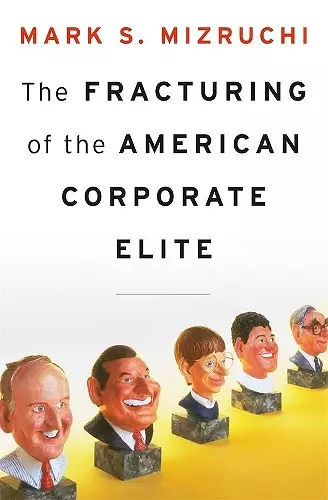The Fracturing of the American Corporate Elite
Format:Hardback
Publisher:Harvard University Press
Published:6th Jun '13
Currently unavailable, and unfortunately no date known when it will be back

In the aftermath of a financial crisis marked by bank-friendly bailouts and loosening campaign finance restrictions, a chorus of critics warns that business leaders have too much influence over American politics. Mark Mizruchi worries about the ways they exert too little. The Fracturing of the American Corporate Elite advances the surprising argument that American CEOs, seemingly more powerful today than ever, have abrogated the key leadership role they once played in addressing national challenges, with grave consequences for American society.
Following World War II, American business leaders observed an ethic of civic responsibility and enlightened self-interest. Steering a course of moderation and pragmatism, they accepted the legitimacy of organized labor and federal regulation of the economy and offered support, sometimes actively, as Congress passed legislation to build the interstate highway system, reduce discrimination in hiring, and provide a safety net for the elderly and needy. In the 1970s, however, faced with inflation, foreign competition, and growing public criticism, corporate leaders became increasingly confrontational with labor and government. As they succeeded in taming their opponents, business leaders paradoxically undermined their ability to act collectively. The acquisition wave of the 1980s created further pressures to focus on shareholder value and short-term gain rather than long-term problems facing their country.
Today’s corporate elite is a fragmented, ineffectual group that is unwilling to tackle the big issues, despite unprecedented wealth and political clout. Mizruchi’s sobering assessment of the dissolution of America’s business class helps explain the polarization and gridlock that stifle U.S. politics.
A striking interpretation of our present economic and political plight. Mark Mizruchi sees many of our problems nested in the dissolution of the ruling business elite that exercised a moderating influence from World War II to the 1970s. Counterintuitive, impeccably researched, closely argued, and depressingly on target. -- Charles Perrow, Yale University
This book will become a seminal contribution to our understanding of the nature and transformation of the U.S. corporate elite over the past century. -- Richard Lachmann, University at Albany, State University of New York
Mizruchi shows that in the postwar years, corporate leaders, whatever their weaknesses, put their heads together when the going got tough and came up with political solutions. The system was not altogether democratic, but it resulted in effective problem solving, and a means of bringing the powerful together to pursue the nation's common goals. That system has fallen apart. This captivating story, told with fluidity and grace, provides a compelling explanation for today's failure of political ingenuity and compromise. -- Frank Dobbin, Harvard University
[Mizruchi] claims that business has abdicated responsibility for developing and advocating practical solutions to national, as opposed to purely sectional, interests. His view will perhaps come as a shock to those accustomed to the ideological divides of our current political landscape. Mizruchi shows how, in the past, businesses had been prepared to cooperate with both government and labor organizations in the common pursuit of national objectives. * Kirkus Reviews *
According to the author, the disintegration of America's corporate leadership began in the 1980s. Since then, the principle of moderation has given way to self-interest and extremism. Mizruchi tells us to think twice about the current denigration of the country's corporate elite. In making his case, he recants many of his own youthful prejudices, seeing advantages in the vanished economic order elites once established. His line of thought is persuasive. Anti-elitists, corporate critics, and economic planners can all learn from his sound and sober revisionism. * Publishers Weekly *
Offers a compelling history of how the American corporate elite reconciled itself to the New Deal, and then, in the aftermath of World War II, signed on to a vision of America in which government played a muscular and essential role in steering the economy and underwriting the well-being of the middle class...Mizruchi's secret history of a time when corporate America believed in government and in paying taxes--and the riffs he adds to the more familiar tune of how business became more conservative--are assembled here in the service of a larger argument: This right-hand turn by the country's corporate elite has been bad for business and bad for America. Mizruchi describes a business elite that has become fragmented, irrelevant, and powerless to solve the problems--like mounting national debt, decaying infrastructure, and failing schools--that, in the long-term, will hurt the vested interests of corporate America. -- Chrystia Freeland * Democracy *
Mizruchi makes a convincing case. -- Andrew Hacker * New York Review of Books *
- Nominated for Max Weber Award 2014
- Nominated for Society for the Study of Social Problems C. Wright Mills Award 2013
- Nominated for Woodrow Wilson Foundation Award 2014
ISBN: 9780674072992
Dimensions: unknown
Weight: unknown
384 pages